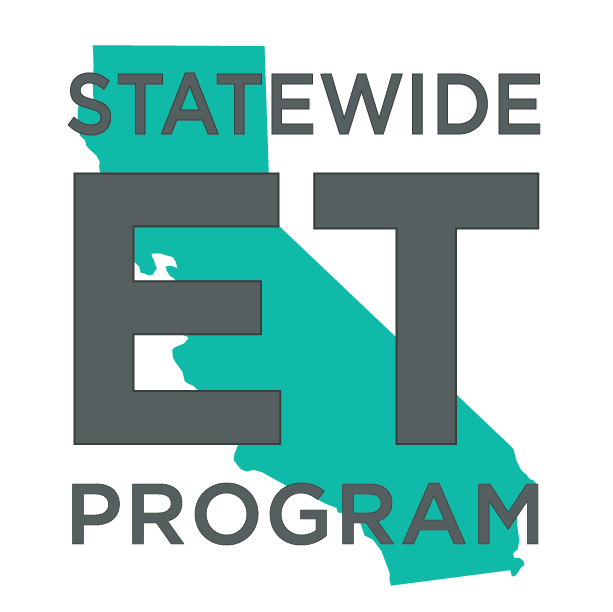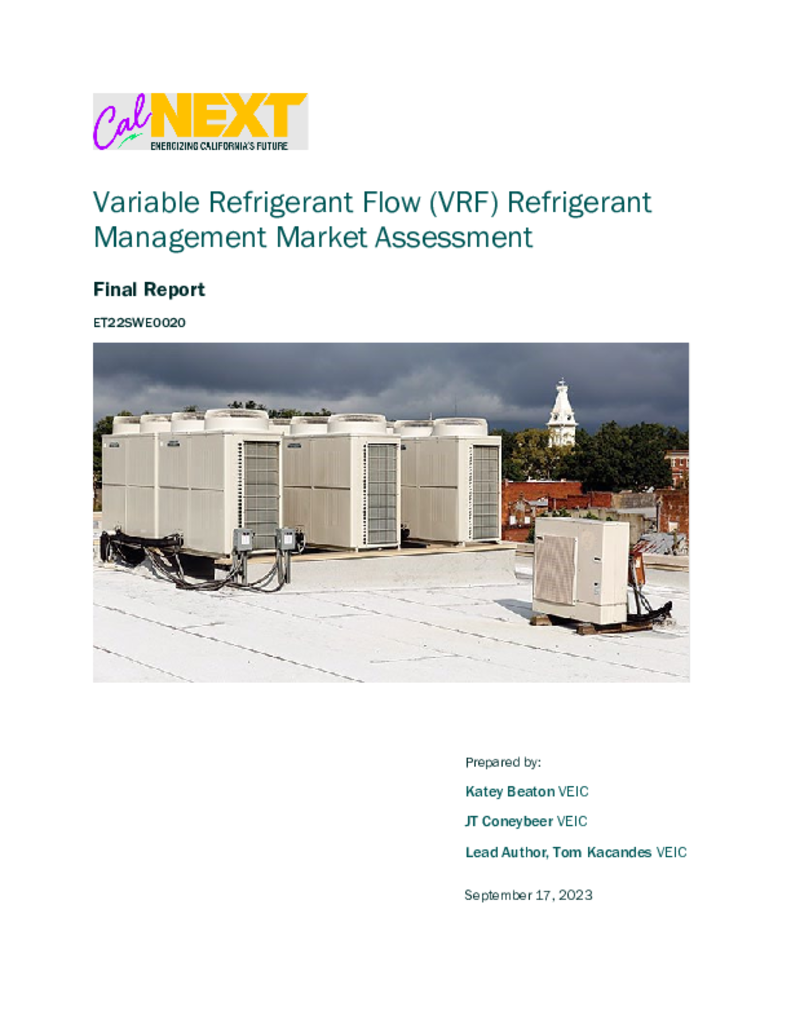ET22SWE0020 - Variable Refrigerant Flow (VRF) Refrigerant Management Market Assessment
Building electrification initiatives are resulting in an explosion of electrified heating and cooling (heat pump) systems being installed in residential and commercial buildings. Electrifying the building sector is a critical step toward meeting California’s decarbonization goals; however, the refrigerants used in heat pumps contain greenhouse gases (GHGs) thousands of times more warming than carbon dioxide and even methane. While keeping refrigerant from leaking into the atmosphere is critical for all heat pump applications, large commercial building systems often require extensive field-installed piping and significant refrigerant charge (amount)- a combination that creates high emissions potential. As these heat pumps, increasingly referred to as variable refrigerant flow (VRF) systems, replace fossil-fuel powered equipment in both new and existing buildings, the potential GHG impact of refrigerant leaks needs to be understood and cost-effective mitigation strategies must be incorporated into building electrification initiatives. In addition to the direct global warming impact of refrigerant leaked into the atmosphere, studies have shown that heat pump systems operating with insufficient refrigerant also consume more energy, contributing to higher electric bills and power generation emissions. This market assessment will provide clarity on anticipated market adoption of VRF systems, the lifetime GHG emissions potential of those systems if no action is taken, and the mitigation strategies that can be implemented to maximize that environmental, economic, and social benefits of commercial heat pumps. Additionally, the project will build upon and complement the current Commercial VRF Fuel Substitution measure development activity also being performed by Energy Solutions, by bringing in new market study activities including stakeholder engagement and a deeper focus on new system installations. The measure development project is focused on the measure package / work paper for VRF’s using newer energy models. It is reevaluating the measure as a prescriptive offering for retrofits or gut rehab/major renovations. With this VRF Refrigerant Management market study we will review past research and lessons learned to maximize the benefits of adoption of VRF’s by getting ahead of potential negative issues associated with leaks and/or improper installation and maintenance.
This report seeks to examine the impact of Variable Refrigerant Flow (VRF) technology in the context of California's energy and environmental policy objectives and evaluate the suitability of continuing to incentivize VRF technology within utility energy efficiency portfolios, considering its impact on greenhouse gas (GHG) emissions and refrigerant usage.
The key objectives of this report are to (1) estimate the existing stock of refrigerants in California buildings’ HVAC systems by equipment type; (2) calculate the potential impact of these systems leaking on the State’s emissions reduction goals; (3) review current policy objectives to drive heat pump adoption and the requirements to reduce refrigerants; (4) cross-examine the emissions and efficiency impact of VRF technology against these policies and HVAC technology alternatives; and (5) identify and recommend actions needed to ensure utility efficiency incentives align and support CARB’s policy to reduce GHG emissions and HFC refrigerant-based HVAC specifically.
A range of approaches—including both primary and secondary research methodologies—were employed to gather insights and knowledge about the current market conditions, policy objectives, technological advancements, and stakeholder perspectives on this topic. This involved the review and analysis of publicly available information including building stock data, HVAC equipment descriptions, case studies, and training materials alongside interviews with industry stakeholders— equipment installers, manufacturing representatives, and independent engineering and technology experts. In addition, a conceptual building system comparison exercise was conducted to assess the difference between similar cooling load-dominated HVAC system designs (including VRF) relative to system refrigerant charge reduction and integration of leak detection opportunities as well as overall refrigerant emissions impact and energy efficiency.
The findings in this report indicate that the total refrigerant load across California's building stock for existing HVAC systems (residential and commercial combined) is 58,217,452 pounds, with residential buildings accounting for 48,866,000 pounds of refrigerant, and commercial buildings accounting for 9,351,452 pounds of refrigerant. Further, based on informed leak rate assumptions, this report estimates the annual GHG impact of refrigerant leaks across these sectors to be approximately two million metric tons (MMT) of CO2e, with the largest contribution coming from residential central air conditioning (CAC) systems and commercial packaged single-zone air conditioning (AC) systems.
Overall, this report’s analysis suggests that that the operating efficiency of VRF technology may not be as advertised, and that given the challenges in independently verifying the efficiency and leak rates of VRF systems in real-world installations, there is a need to suspend VRF incentives and further examine the next generation VRF systems against HFC reduction targets set by California Air Resources Board (CARB) and consideration of alternative and emerging HVAC systems that can safely use near zero GWP refrigerants like R-290 as solutions for space heating and cooling decarbonization in the future.

